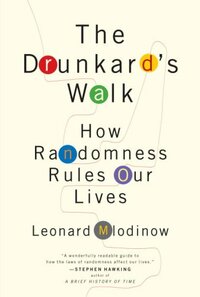Take a photo of a barcode or cover
Listened to this as an audiobook and it was difficult to focus on. Sort of drifted in and out, but many of the examples were interesting.
"Excellent, everyday-math that everyone should know better. Read excerpts for my stats class, wanted to finish it."
This is the book that Gladwell's Outliers should have been. A really impressive look at both the development of statistics from a historical point of view, as well as really showing what this means in our own lives. Lot's of interesting examples, and plenty to back it up. You'll never look at a poll, a jury verdict, or a medical study the same way again.
This book is a very readable analysis of various research over the past several hundred years that looked at aspects of odds, chance, luck, statistical likelihood of certain events occurring, etc. The historical context and the way he relates chapters to one another as part of the development of statistics and related analysis as an independent field (and as an important component in many other fields) is fascinating. I don't have enough background in stats to call this an easy read, but it's definitely a worthwhile read.
Best/most useful book I've read in 2012. Even for someone with a background in statistics, this was a great refresher and concise history. For those interested in everything from box scores to politics to crime, this will prove engaging for those willing to take their time with the book. I found myself referencing almost every annotation in the back of the book. if you skim, you wont take much away other than trivia. if you take your time, you'll be able to spot bad usage of statistics, and recognize randomness when it is characterized as genius, luck as wizardry.
i cannot recommend this book enough for those who want the truth behind stats and surveys.
i cannot recommend this book enough for those who want the truth behind stats and surveys.
Lets just say that out of pure randomness, this book happened to be at 2 standard deviations higher than the mean.
informative
medium-paced
The first 3/4th or so of the book is an interesting history lesson on the development of statistics and probability theory. The last quarter is a poorly written pop-philosophy lecture on why success is based not on talent but on persistence. It's worse than it sounds. I'd like to see more stuff like this, more anti- John Rawls stuff, but done better. Read the first three quarters and toss it.
For people who aren't conversant with probability and statistics in general, this is an excellent book for an introduction. For others, though, it feels like that there's a lot of consequences that are unique to modern day that could have been considered in light of these ideas to make the book more interesting to more fluent readers, without losing the accessibility of the book. In general, though, the average person who reads non-fiction would probably find this edifying.
inspiring
reflective
slow-paced
Livro que promete uma ideia que aborda o acaso e a sorte e entrega um livro que fala de empresas e coisas óbvias, sem graça e pouco agregador, eu já li outros livros parecidos mas fiquei muito frustrado nesse, até os casos reais dos quais o livro usa como embasamento me deu preguiça de achar
